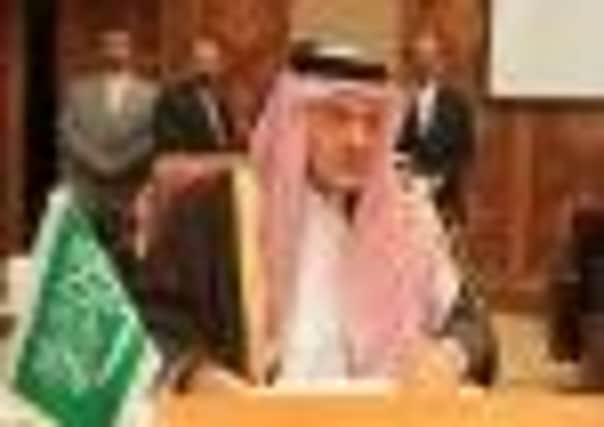Saudi pulls observers out as mission fails to halt Syria bloodshed


Hundreds of Syrians have been killed since the observers began their work in late December and political opponents of Syrian president Bashar al-Assad are demanding the Arab League refer the crisis to the United Nations Security Council.
Arab League chief Nabil Elaraby recommended to Arab foreign ministers yesterday that a monitoring mission to Syria be extended, expanded and get more technical support.
Advertisement
Hide AdAdvertisement
Hide AdThe Saudi move suggests, however, that the extension of a mission Syria’s opposition has described as toothless will not be enough to satisfy everyone in the 22-member body and exposed a growing rift over the best way to approach the crisis that has shown little sign of easing after months of political pressure.
“My country will withdraw its monitors because the Syrian government did not execute any of the elements of the Arab resolution plan,” Prince Saud al-Faisal told Arab foreign ministers at a closed door meeting in Cairo.
“We are calling on the international community to bear its responsibility, and that includes our brothers in Islamic states and our friends in Russia, China, Europe and the United States,” Prince Saud said, calling for “all possible pressure” to push Syria to adhere to the Arab peace plan.
Saudi Arabia, the region’s political and economic powerhouse, exerts enormous influence over other Gulf countries which tend to fall in line with its policies.
Arab diplomatic sources have said in recent weeks, however, that Bahrain, Kuwait and Oman are increasingly reluctant to step up pressure on Syria when they are facing protests at home. Outside the Gulf, Iraq and Algeria are also opposed to any increase in pressure and Egypt and Tunisia want to resolve the crisis within the League, without the UN.
Qatar, which has led calls for escalation against Syria, said it was time to review the whole mission and consider dispatching Arab peacekeeping troops to quell the violence that the UN said has killed more than 5,000 people. Syria claims 2,000 security personnel have been killed in the violence.
“The reality says that the bloodshed has not stopped and the killing machine is still working and violence is spread everywhere,” Qatari prime minister Sheikh Hamad bin Jassim al-Thani said in a statement.
The Security Council is also split on how to address the crisis, with Western powers demanding tougher sanctions and a weapons embargo, and Mr Assad’s ally Russia preferring to leave the Arabs to negotiate an outcome.
Advertisement
Hide AdAdvertisement
Hide AdMeanwhile, in the satellite town of Douma, only miles from Damascus, video yesterday showed armed Free Syrian Army rebels in masks patrolling the streets openly.
“Now there is fighting around the city. I can hear gunshots and loud explosions,” an activist living in Douma told The Scotsman. “Assad’s army are only on the outskirts, but we expect that they will use tanks to advance.”
Army deserters aligned to the Free Syrian Army, backed by armed civilians had succeeded in pushing back government troops, briefly taking control of the town late on Saturday night. For a few hours, the town lay quiet, the insurgents victorious, activists reported.